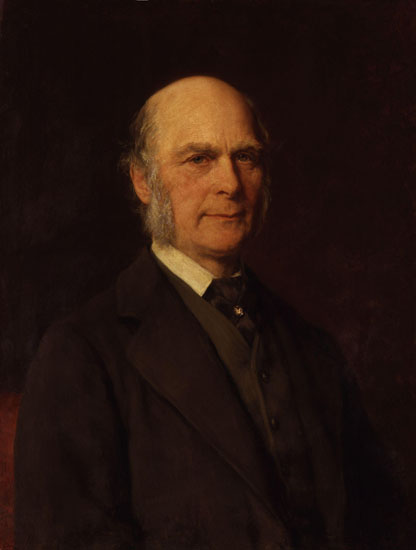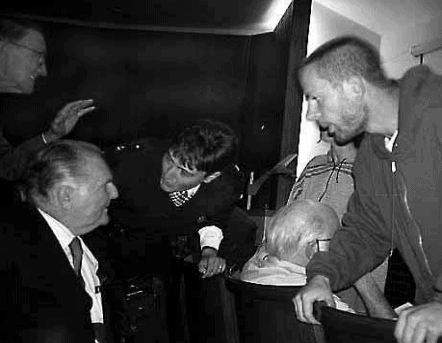London Lefties Trample on Free Speech
Glayde Whitney, American Renaissance, December 1999
On Friday, September 17, 1999, a small group of disheveled and unruly children was allowed to shut down a conference sponsored by the Galton Institute on the topic of “Man and Society in the New Millennium.” From the ignoble events that transpired on that sunny day, it appears that the current people of once-great Britain do not know better than to reward uncivil behavior. Like parents who give in to temper tantrums from a child, they are training their youngsters toward escalating nastiness.
The venerable British group that sponsored the conference was organized in 1907 as the Eugenics Education Society and later shortened its name to the Eugenics Society. Finally in 1988, in response to unrelenting demonization of eugenics, the society adopted the more innocuous name of the Galton Society in honor of Sir Francis Galton (1822–1911), the founder of eugenics.

Sir Francis Galton
The conference was a two-day event held at the Zoological Society of London, on the edge of Regents Park across the street from the London Zoo. The first day of the admission-by-ticket-only event went off as scheduled and without disruption. An audience of 120 or so heard interesting talks from such eminent professors as J. H. Edwards of Oxford and Fellow of the Royal Society (“Genetics: Old and New”) and Richard Lynn, Director of the Ulster Institute for Social Research (“Quality of Population: Scenarios for the New Eugenics”).
Early on the morning of the second day there were hints of trouble. Before the conference began a few scruffy-looking young people tried to get in by presenting obviously counterfeit tickets. They were turned away and the police called to prevent trouble. The police left as the conference began on schedule without incident. The first speaker was Professor Mike Murphy from the London School of Economics, who spoke on “Prospects for population size and structure at the start of the new millennium.” Needless to say, unless there are drastic changes the prospects range from dismal to terrifying.
I was the next speaker and was called to the podium. While I was waiting to be introduced, a group of only about 10 of the scruffy youth noted earlier marched into the room and took up a position near the podium. They then tried to unfurl a long banner across the front of the lecture hall. The audience waited politely while the children first twisted and untwisted their banner, then turned it right-side-up. They called themselves “People Against Eugenics,” and their banner read DIVERSITY, NOT EUGENICS. Then began an unruly dialogue between various members of the audience and the disrupters.
I left my lecture notes on the podium and retired to a seat in the second row.

Demonstrators harangue Arthur Jensen while Walter Kistler tries to reason with them.
There was some shouting back and forth, including calls of “Professor Whitney, where is he? Is he here? Where is Professor Whitney?” I returned to the podium to retrieve my notes and once again sat down and proceeded to take photos.
The mob immediately recognized the much better-known Arthur Jensen, and verbally assaulted him at close range. Walter Kistler of the Foundation for the Future rose to Prof. Jensen’s defense. He urged the mob to let the speakers speak. The mob refused, and since its members had used the word “Nazi” Mr. Kistler suggested that it was they who were acting like Nazis. His attempt to reason with them became a shouting match.
In the meantime members of the Galton Institute were trying to negotiate with the demonstrators. One suggestion was that they could have a few minutes to have their say, after which they could stay and listen to the scheduled speakers. Another was that they schedule their own conference and a deputation from the institute would attend. The children would have none of it. No speech for eugenicists was their stand.
The police returned in some force, but instead of evicting the trespassers, they did nothing; perhaps they were there only to prevent physical harm. The situation slowly deteriorated into groups of restless people wandering around between the lobby and the conference room, waiting and grumbling. Dr. Robert John, head of the International Council for Human Ecology and Ethnology, tried to organize resistance. He strode into the lobby and called in a very loud voice for an effort to present the police with a united demand that the demonstrators be evicted. He also spoke eloquently about civility and free speech, but nothing came of his efforts.
Eventually there was an announcement that the Zoological Society wanted the premises cleared and closed. The police began politely to escort both attendees and mob out of the building. The protesters carried the day, shutting down the conference before I could speak and preventing Professor Jensen from delivering the keynote Galton Lecture.
Afterwards there was some milling around in front of the building while a couple of elderly handlers of the scruffy children passed out a handbill called “No to Eugenics! Diversity not Discrimination!” It said they were demonstrating because “at the meeting are three speakers [Richard Lynn, Arthur Jensen, and myself] who claim that black people are genetically inferior to white people and also are genetically programmed to be more violent and aggressive. It is unacceptable that such incitement to racial hatred be permitted.”
If anyone was inciting hatred, it was the British press. On the very day of the conference, the Daily Mail ran an interview with Prof. Jensen headlined “Is This Man Truly the World’s Most Loathsome Scientist?” Journalist Mary Riddell couldn’t wait to tell readers what to think. In her second sentence she wrote: “The Daily Mail does not agree with his views on intelligence indeed, we profoundly disagree with them.” She then went on in the condescending tones of the ignorant:
For three decades, Professor Arthur Jensen has lived in the shadow of death and violence. It is difficult, however, to feel sorrow for him . . .
From the White House downwards, the bleak scenarios painted by Jensen — particularly on race — have been reviled. One study was banned shortly after a presidential aide warned that Jensen’s work had no place in the culture of modern America. Liberals have argued that his work, which ignores the effects of poverty and deprivation on intelligence, is misguided and flawed. Learned journals have blacklisted his books as unsuitable for review . . .
One expects the Dr. Strangelove of social science to be a wild-eyed zealot, but Jensen — who is 76 — is a smoothly groomed and mild-mannered man whose tie clip, flannels and gilt-buttoned navy blazer suggest a lifetime of golf club dinners . . .
There is, in all of Jensen’s arguments, a chilliness imposed, one assumes, by a statistician’s existence in which lives are measured by graph or bell curve rather than by love or nurture . . .
. . . the powers of parental love to mould ambition, aspiration and self-determination — whether among blacks or whites — are woolly, unscientific concepts that his cold scientific mind finds impossible to comprehend.
Professor Jensen, for all his apparent mildness, is one of the most chilling men I have ever interviewed. It was an enormous relief to step outside and breathe fresh air once again.
This sort of thing is, if anything, even more common in Britain than in the United States. Peregrine Worsthorne is a “conservative” who writes sensibly on many subjects, but who cannot stomach IQ research. In an Oct. 30, 1994 article in the Sunday Telegraph called “Race and IQ: Never Has a Knife Been Put in More Smoothly,” he writes of intelligence studies:
That these are important questions, and scientifically worthy subjects for research, I cannot deny. Nevertheless, they are so distasteful, so certain to give such deep offense to so many, that people who choose to pursue them — among all the equally important subjects demanding attention — can only be disturbingly insensitive . . .
. . . I still feel that the people involved in this research are pretty nasty pieces of work whom I would not wish to know. And the timing is so particularly cruel, smothering black pride forever, just as it is beginning to breathe freely.
In the old days, theorists of racial superiority or inferiority positively glorified in their insensitivity; made no attempt to cushion the cruelties of their conclusions — sterlization for the inferior. Their American successors are much more concerned and sophisticated, more gentle, caring, and squeamish. “It hurts us more than it hurts you’ is the new motif. Never has a knife been put in more smoothly, leaving so little blood on the blade. Crude they are most certainly not: only creepy.
This is just the kind of encouragement louts need to shut down academic meetings.















